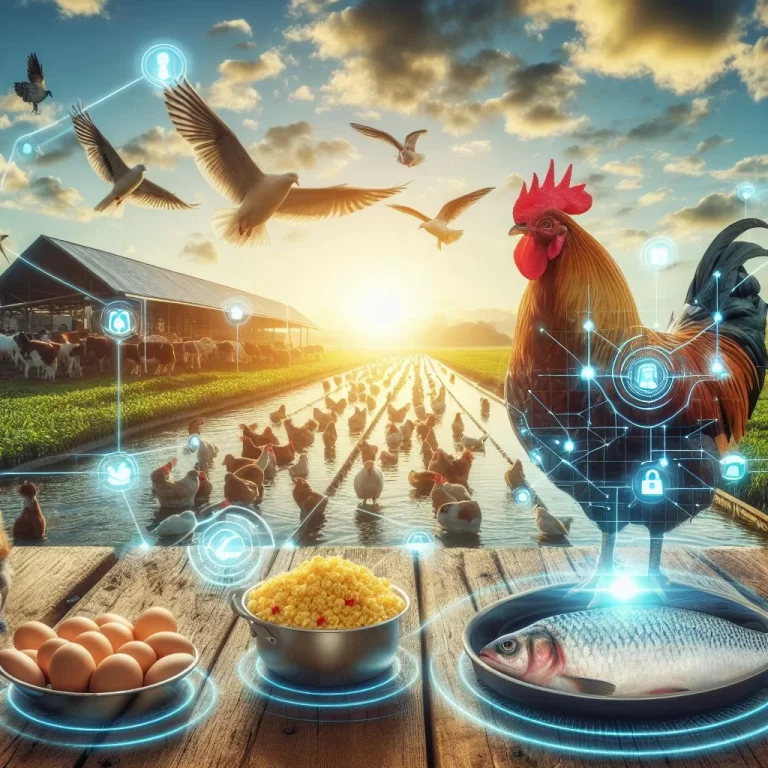
Artificial intelligence is transforming the livestock, fisheries, and poultry industries. With the help of AI, farmers can increase productivity, improve animal welfare, and meet the growing demand for food sustainably
Prof Dr. Abdullah G Arijo
“Old is not always gold.” This saying holds in today’s fast-paced world where we need to embrace new technology and adopt new protocols. To do this, we must take a multi-pronged approach that involves implementing various training methods such as written instructions and live video training to cater to different learning styles. We should also allow everyone to experiment and learn without the fear of failure. It’s essential to encourage a culture where mistakes are seen as part of the learning process in Pakistan. From monitoring and forecasting to disease management and farm optimization, AI offers numerous benefits to the agricultural sector.
 As global populations continue to grow, the demand for essential food products like eggs, meat, and milk is on the rise. Modern animal husbandry and aquaculture technologies are incorporating artificial intelligence to meet these demands efficiently. Let’s delve into the key areas where AI plays a crucial role in livestock and poultry farming.
As global populations continue to grow, the demand for essential food products like eggs, meat, and milk is on the rise. Modern animal husbandry and aquaculture technologies are incorporating artificial intelligence to meet these demands efficiently. Let’s delve into the key areas where AI plays a crucial role in livestock and poultry farming.
Read: APPLICATION OF ARTIFICIAL INTELLIGENCE (AI) FOR LIVESTOCK & POULTRY FARM MONITORING
Monitoring and Forecasting
Sensor Data: Farms generate a deluge of sensor data related to animal behavior, health, and environmental conditions. AI algorithms can analyze this data to monitor livestock and predict trends.
Health Alerts: AI systems notify farmers when there are changes in animal behavior, enabling timely intervention. For instance, if a cow’s activity pattern deviates, the system alerts the farmer to investigate further.
Disease Management
Early Diagnosis: AI can detect diseases at an early stage by analyzing data from sensors, such as temperature, weight, and movement patterns. Early diagnosis allows prompt treatment and prevents significant losses.
Biosecurity: AI helps in maintaining biosecurity by identifying potential threats and implementing preventive measures. For example, it can detect unusual patterns that may indicate disease outbreaks.
Optimization of Farm Operations
Automated Systems: AI-driven automation minimizes manual labor and ensures efficient farm operations. Automatic feeding, milking, and waste management systems enhance productivity.
Quality Control: Smart sensors equipped with AI capabilities evaluate milk quality, detect anomalies, and improve overall product quality.
Consumer Behavior Insights
Data Analytics: AI analyzes consumer behavior patterns, purchasing trends, and preferences. Livestock farms can use this information to tailor their products and marketing strategies.
Precision Marketing: By understanding consumer preferences, farmers can optimize production and distribution, leading to better market positioning.
Case Study: Smart Cow House
Researchers built a smart cow house equipped with sensors that monitor cow activity, weight, and disease using AI. This early tracking system aids in disease prevention and ensures healthier livestock.
AI in Fisheries
While AI’s impact on fisheries is less explored, it holds promise:
Fish Behavior: AI can analyze fish behavior patterns to optimize feeding schedules and reduce stress.
Aquaculture Management: AI assists in water quality monitoring, disease detection, and efficient fish farming.
AI in Poultry Farming
Egg Production: AI helps predict egg production based on factors like light exposure, temperature, and feed quality.
Broiler Farming: Automated systems regulate broilers’ temperature.
Artificial intelligence is transforming the livestock, fisheries, and poultry industries. With the help of AI, farmers can increase productivity, improve animal welfare, and meet the growing demand for food sustainably. In Pakistan, the adoption of AI-based practices would lead to a more efficient and profitable agricultural sector. More efficient and profitable agricultural landscape.
Read: The Ascendance of Artificial Intelligence: Blessing or Curse
_________________
 Prof. (R) Dr. Abdullah G. Arijo is Advisor and Visiting Professor, SBBUVAS, Sakrand, Pakistan. He is Ex-Chairman, Department of Parasitology, Sindh Agriculture University and Ex-Advisor Academics & P&D to Vice Chancellor SAU Tandojam
Prof. (R) Dr. Abdullah G. Arijo is Advisor and Visiting Professor, SBBUVAS, Sakrand, Pakistan. He is Ex-Chairman, Department of Parasitology, Sindh Agriculture University and Ex-Advisor Academics & P&D to Vice Chancellor SAU Tandojam
Great awareness on using modern scientific tool to cope with challanges
Appreciateable Sir! 👏🏻✨
Very good 😊
Nise ❤️
Knowledgeable 🥰
Good sir❤️
Nice sir❤️
Good sir
Good article 🥰
Nice 👍🏻
Nice 👍
Good sir 👍🏻
Good article
This article provides a comprehensive overview of its evolving role, highlighting its potential to do distinctive things. It’s important to keep learning about AI because it’s going to keep changing the world.
GOOD
Article is better😊
Good article
Great sir 💗
Very good
No Doubt Always Old Isn’t Gold We Can Get Advantages From (AI).
[…] Read: Role of Artificial Intelligence in Livestock, Fisheries, and Poultry Farming […]
[…] Read: Role of Artificial Intelligence in Livestock, Fisheries, and Poultry Farming […]